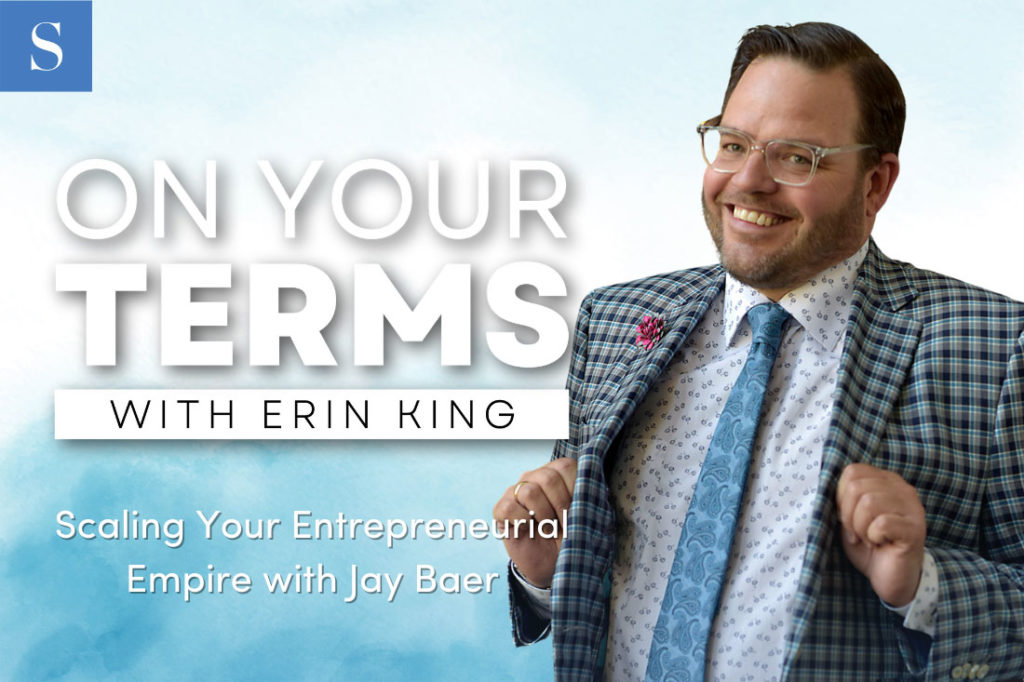The last few years have been interesting for entrepreneurs as the pandemic forced us all to slow or stop many of our daily activities and reevaluate what matters most. That’s exactly what happened to New York Times best-selling author and entrepreneur Jay Baer, who sold his company during the pandemic and now works primarily out of his house instead of spending 200 days a year on a plane.
On Your Terms with Erin King is no longer releasing new episodes on the SUCCESS Podcast Network, but you can still listen to the full conversation below.

What are you actually afraid of?
Although Baer is a seventh-generation entrepreneur—his family has been self-employed since the early 1800s—he didn’t start his first company before the age of 30. Married with a young daughter, he kept putting off his dreams in favor of stability until something major happened that shifted his worldview. His best friend since second grade, who by that time had become his brother-in-law, announced he had brain cancer. Baer went in and quit his job the next day. It was the push he needed, as he’d been scared of something he had not been able to define. The downside of having a company fail was nothing like what his best friend was facing, so Baer made the leap and went all-in.
Keeping perspective is key
Baer’s favorite saying in business? “[Accept that] some days you’re the pigeon, some days you’re the statue.” It teaches you to keep an even keel, which is something Baer also imparted to his team—they were never doing as well or as badly as they thought they were. While the life of an entrepreneur can often be a rollercoaster, how you deal with those ups and downs is often more important than what the ups and downs actually are. One of Baer’s mentors provided him with a valuable lesson on this point during his first internship. He told Baer to always remember who you are and what you do are not the same, which forever changed Baer’s attitude and approach to business. A business can fail, but that doesn’t mean you’re a failure. Dealing with a lot of loss at a younger age also consistently reminded Baer to keep perspective, as it’s easy to get caught up in stresses or minutiae. Ask yourself, how important is this in the grand scheme of things?
You don’t have to do everything—or be good at everything
During his 13 years as CEO of his company, Baer would audit how he was spending his time in the role to determine how the team could delegate 15% of that work elsewhere. This practice took place every year, and it eventually got to the point that he was only spending time on things he was uniquely qualified to do. He believes you want to get to that point with your leadership as quickly as possible, because any minute spent doing things that someone could do 80% as well is a minute wasted.
Baer enjoys ideation and considers it the thrill of a lifetime, but doesn’t think he’s organized or disciplined enough to tinker with things at scale. Therefore, his plan as an entrepreneur is to get things to a certain size, then get out and let someone else do what they do best.
While some entrepreneurs might not like delegation, preferring to do things themselves because teaching someone takes time, it becomes an issue of reframing. Perhaps it takes longer for the task to get done the first few times, but once the person you’re delegating to picks it up, things become easier.
It’s OK to do less
It took a global pandemic for Baer to unlearn the belief of “more is more” that he’d been taught. But as the structure of his day and life changed, he realized how stressed out he’d been. At first he was very concerned about his team and business, but as both eventually thrived, he saw how he could adjust his live presentations to virtual ones and also spend more time at home with his wife and in his community. He’s much happier now.
Don’t fear pivoting, but embrace change
Baer grows bored easily, and pursues many different passions because he believes that your audience will come along for the ride. While he’s written five books in the same genre, the topics have varied wildly, from social business to content marketing.
Perhaps you think that you can’t pursue a passion because you’re not an expert in the field and whatever you might offer could be considered too basic. However, Baer believes there’s a lot to be said for being good at the 101- or 202-level content. Your audience is always the person you used to be. Ask yourself what you know that they don’t, then share that.











